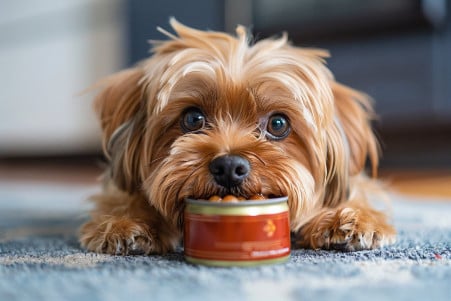Can Dogs Eat Italian Sausage? Risks vs. Benefits Explored
31 May 2024 • Updated 31 May 2024

If you're about to enjoy a delicious Italian sausage, you might be tempted to share a bite with your dog. But can dogs eat Italian sausage without any issues? While some cooked Italian sausage is safe for dogs to eat, it should be fed in moderation because it's high in fat and spices. Ingesting too much fatty sausage can lead to pancreatitis, obesity, and other digestive problems in dogs.
This article will cover the most recent findings from animal nutritionists and veterinarians about the potential risks and benefits of feeding Italian sausage and other processed meats to dogs. Through this investigation, you will gain a better understanding of the potential risks and benefits. By looking at dietary recommendations, real-life examples, and input from experts, you will have the information you need to decide whether you can treat your dog to a small piece of your sausage.
Can dogs eat Italian sausage?
Health Risks of Feeding Dogs Italian Sausage
There are many potential health risks associated with feeding dogs Italian sausage, including high fat and sodium content and the presence of seasonings that are toxic to dogs. According to Pure Pet Food, even one sausage can contain over four times the recommended daily sodium intake for a medium-sized dog. The high fat content, which can be anywhere from 8-12g per sausage link, can lead to obesity and pancreatitis.
In addition, many sausages contain garlic, onion powder, and nutmeg, all of which are toxic to dogs and can result in anemia, vomiting, and lethargy. The ASPCA notes that consumption of these ingredients can lead to kidney failure and even prove fatal.
Moreover, the preservatives and additives in processed meats can lead to vitamin and nutrient deficiencies. However, the most worrisome risk is that sausages, like all processed meats, are classified as known carcinogens by the World Health Organization, meaning they can cause cancer. This is especially concerning since 1 in 4 dogs will develop cancer, according to Pure Pet Food. Clearly, the health risks of feeding Italian sausage to dogs are many and quite serious, making it a much better idea to opt for safer protein sources.
Healthier Protein Options and Snacks for Dogs
Instead of giving dogs Italian sausage, which is high in fat, sodium, and potentially harmful spices, pet parents can opt to give their dogs plain, unseasoned proteins like cooked chicken, turkey, or lean beef. Sploot Vets recommends these as healthy, balanced sources of protein for dogs.
Homemade dog treats can also be a healthier alternative to sausage. For example, the recipe from It Doesn't Taste Like Chicken includes ingredients like ground flaxseed, unsweetened applesauce, natural peanut butter, and whole wheat flour to make treats that are nutritious and delicious. These treats are full of fiber, vitamins, and minerals that can help support a dog's health.
Cooked vegetables like pumpkin, green beans, carrots, and spinach can also be great options to add to a dog's diet, providing necessary nutrients without the dangers of sausage. Sploot Vets explains that small amounts of fresh fruits like apples and bananas can be used as treats, but their sugar content means they should be given in moderation.
For a food that can be used in a variety of ways and is good for dogs, Sploot Vets suggests cooked oatmeal, which can be a source of fiber, vitamins, and fatty acids for dogs. Oatmeal can be mixed in with a dog's regular food or served as a treat on its own.
While a small amount of Italian sausage may not cause immediate harm to most dogs, the potential dangers of feeding it to dogs on a regular basis mean it's best to avoid giving this type of processed meat to pets. By opting for these healthier protein options and snacks, pet parents can give their dogs options that are both tasty and good for them.
What to Do If Your Dog Eats Italian Sausage
If your dog eats a large amount of Italian sausage, it's important to stay calm and gather information about how much they've eaten. The Hillrose Pet Resort says that instead of panicking, you should try to figure out how much sausage your dog ate and when they ate it.
Call your vet or an emergency animal hospital right away and make sure you give them the most accurate information you can. Don't try to make your dog throw up at home, as it can be dangerous if you're not instructed by a vet on how to do it properly. Depending on the amount of sausage your dog ate and their size, the vet may recommend making them throw up or providing supportive care to help them through any symptoms.
In more serious situations, dogs may need to be hospitalized and treated for conditions like pancreatitis or salt poisoning that can result from eating a lot of sausage, according to Vets Now. It's important to get your dog to the vet as soon as possible because waiting can lead to more serious health problems.
Is Cooked Italian Sausage Safe for Dogs?
Cooking Italian sausage doesn't make it safe for dogs to eat because many of the same issues still apply. According to Dig-In, cooked sausage is still high in fat, salt, and seasonings that can be toxic to dogs, like garlic and onion powder. While cooking can help reduce the risk of bacteria, it doesn't get rid of the risk of stomach upset or other problems.
While a small amount of cooked Italian sausage is less likely to cause an issue in the short term, it still shouldn't be given to dogs on a regular basis. As the JustAnswer case mentioned, even a small amount can be problematic. If a dog does eat a small amount of cooked sausage, it's best to watch for any signs of a problem and contact a vet if necessary.
Conclusion: Make Sure You're Prioritizing Your Dog's Health and Well-Being
Because of its high fat, sodium, and potentially toxic ingredients like garlic and onion powder, Italian sausage is not a good choice for dogs. It can cause pancreatitis, obesity, salt poisoning, and other health problems in dogs, even in small amounts, and it's not nutritionally beneficial, so there's no reason to give it to your dog.
According to the Rover.com blog, the onion and garlic powder in Italian sausage can lead to anemia in dogs, and the spicy seasonings can cause gastrointestinal upset. Even if the sausage doesn't contain these seasonings, it's still high in fat, so it's not a good choice for dogs.
The PetMD website says that the high fat and sodium content in sausage can lead to pancreatitis and other serious health problems in dogs, and the spices and preservatives in sausage can be toxic to dogs.
Instead, Sploot Vets suggests giving dogs plain, unseasoned proteins like cooked chicken, turkey, or lean beef. You can also give dogs homemade treats, cooked vegetables, and even cooked oatmeal as a healthier alternative to Italian sausage.
Always make sure you're prioritizing your dog's health and well-being when you're deciding what treats and foods to feed them.


